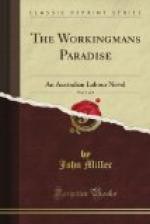Paddy’s Market was in its glory, the weekly glory of a Sydney Saturday night, of the one day in the week when the poor man’s wife has a few shillings and when the poor caterer for the poor man’s wants gleans in the profit field after the stray ears of corn that escape the machine-reaping of retail capitalism. It was filled by a crushing, hustling, pushing mass of humans, some buying, more bartering, most swept aimlessly along in the living currents that moved ceaselessly to and fro. In one of these currents Ned found himself caught, with Nellie. He struggled for a short time, with elbows and shoulders, to make for himself and her a path through the press; experience soon taught him to forego attempting the impossible and simply to drift, as everybody else did, on the stream setting the way they would go.
He found himself, looking around as he drifted, in a long low arcade, brilliant with great flaring lights. Above was the sparkle of glass roofing, on either hand a walling of rough stalls, back and forward a vista of roofing and stalls stretching through distant arches, which were gateways, into outer darkness, which was the streets. On the stalls, as he could see, were thousands of things, all cheap and most nasty.
What were there? What were not there? Boots and bootlaces, fish and china ornaments, fruit, old clothes and new clothes, flowers and plants and lollies, meat and tripe and cheese and butter and bacon! Cheap music-sheets and cheap jewellery! Stockings and pie-dishes and bottles of ink! Everything that the common people buy! Anything by which a penny could be turned by those of small capital and little credit in barter with those who had less.
One old man’s face transfixed him for a moment, clung to his memory afterwards, the face of an old man, wan and white, greybearded and hollow-eyed, that was thrust through some hosiery hanging on a rod at the back of a stall. Nobody was buying there, nobody even looked to buy as Ned watched for a minute; the stream swept past and the grizzled face stared on. It had no body, no hands even, it was as if hung there, a trunkless head. It was the face of a generation grown old, useless and unloved, which lived by the crumbs that fall from Demos’ table and waited wearily to be gone. It expressed nothing, that was the pain in it. It was haggard and grizzled and worn out, that was all. It know itself no good to anybody, know that labouring was a pain and thinking a weariness, and hope the delusion of fools, and life a vain mockery. It asked none to buy. It did not move. It only hung there amid the dark draping of its poor stock and waited.
Would he himself ever be like that, Ned wondered. And yet! And yet!
All around were like this. All! All! All! Everyone in this swarming multitude of working Sydney. On the faces of all was misery written. Buyers and sellers and passers-by alike were hateful of life. And if by chance he saw now and then a fat dame at a stall or a lusty huckster pushing his wares or a young couple, curious and loving, laughing and joking as they hustled along arm in arm, he seemed to see on their faces the dawning lines that in the future would stamp them also with the brand of despair.




